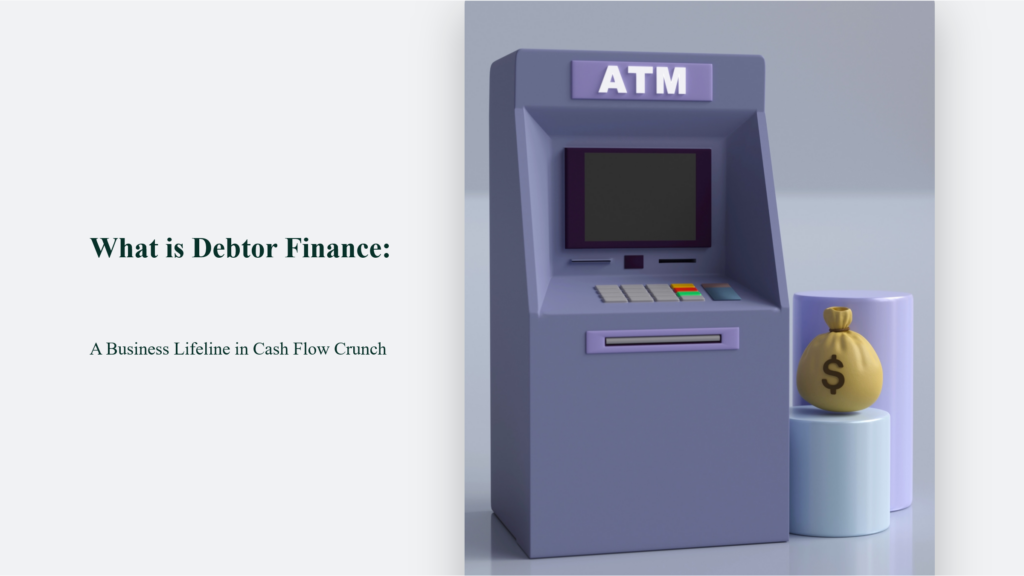In the ever-evolving landscape of business finance, a critical lifeline often overlooked by many is debtor finance. This financial tool, though not new, has become increasingly relevant in today’s fast-paced business world, where maintaining a healthy cash flow can be as challenging as navigating a complex labyrinth.
In this comprehensive guide, we dive deep into what is debtor finance, unravelling its intricacies, benefits, and suitability for different business models.

What is Debtor Finance?
In the labyrinth of business finance, Debtor Finance emerges as a beacon of hope for companies grappling with cash flow constraints. This financial maneuver involves a business using its accounts receivable ledger as Collateral to secure funding. Simply put, it’s like a cash advance against the money your customers owe you.
The Two Sides of Debtor Finance
Debtor finance can be primarily split into two categories:
- Confidential Invoice Discounting: Here, the business dance goes on as usual, with customers unaware of the financing arrangement. The business retains control over its sales ledger and debt collection.
- Factoring (Disclosed Debtor Finance): Customers know the financier’s involvement in this arrangement. This option suits businesses that might not have the resources to manage credit control and collections.
The Nuts and Bolts of the Process
Here’s a step-by-step breakdown of how the debtor finance process typically works:
- Sale and Invoice Issuance: The process starts when your business delivers a product or service to a customer and generates an invoice for this transaction.
- Invoice Submission to Finance Company: Along with sending the invoice to the customer, you submit it to your chosen debtor finance company. This step is crucial as it initiates the financing process.
- Receiving the Advance: After verifying the invoice details, the debtor finance company provides an advance to your business. This amount usually represents a significant portion of the invoice value, often up to 80-85%.
- Utilization of Funds: The advanced funds are now at your disposal. You can use them for various business purposes, such as paying off debts, covering payroll, or purchasing new supplies.
- Collection and Payment of Remaining Invoice Amount: The finance company then takes on the responsibility of collecting the payment from your customer. Once they receive the payment, they remit the remaining balance of the invoice to you, minus their fees.
Debtor finance is particularly beneficial for small and medium-sized enterprises (SMEs) and can be more flexible and suitable than traditional loans. It’s noteworthy that debtor finance does not typically impact your credit rating unless there are defaults or non-payments from clients. Moreover, unlike traditional loans, debtor finance doesn’t require personal or business assets as Collateral.
The Perks:
- Improved Cash Flow: It’s like an instant cash injection, freeing up the money tied in unpaid invoices.
- Credit Enhancement: Timely supplier payments can enhance your credit relations and financial reputation.
- No Collateral Hassles: Unlike traditional loans, debtor finance doesn’t require your assets as Collateral.
- Flexibility: Choose which invoices to finance and control your cash flow better.
- Creditworthiness Intact: Your credit score remains untarnished, assuming no defaults occur.
- Boost for Growth: This finance model provides the working capital needed for expansion and handling larger orders.
The Ideal Candidates: Who Benefits?
Businesses offering extended payment terms to their customers, from start-ups to established enterprises, find debtor finance particularly beneficial. Industries that involve long inventory cycles, like manufacturing and wholesale, can also leverage this financing model to bridge cash flow gaps.
Preparing Your Business for Debtor Finance
Preparing your business for debtor finance involves several key steps to ensure you’re ready to maximize the benefits of this financial solution.
Understanding Debtor Financing:
Firstly, understand what debtor finance, also known as invoice financing or invoice factoring, entails. It’s a way to leverage your business’s invoices for lending, essentially selling some of them to a debtor finance facility. It is particularly critical for small businesses, where cash flow is pivotal to survival and growth. Cash flow issues are a significant reason behind the failure of many small businesses.
Creating a Business Model That Works:
Your business model should project your growth, including revenue and costs. It should include cost breakdowns (like wages, transport, rent, electricity), customer and sales estimates, and an understanding of your limitations (like space or market size), and should be based on or benchmarked against others in your specific industry.
Setting a Budget:
Your budget acts as a roadmap for your financial journey. It should detail your expected profits and when your costs are due, and should be regularly updated to reflect any changes in your financial situation.
Keeping Track of Your Finances:
Maintaining accurate and up-to-date books is crucial. It helps you monitor your cash flow and identify potential financial issues early on. Knowing your numbers is vital when using debtor finance, as it allows you to understand your financial position and determine how much funding you might need.
Managing Debtors Effectively:
If your business operates on an invoicing model, it’s important to manage the level of debt you’re allowing your customers to have. It involves reminding customers of outstanding invoices, chasing late payments, and monitoring customers with account issues. Consider strategies to encourage faster payment from your customers.
Seeking Professional Advice:
If you’re not financially savvy, consulting with a financial advisor or accountant who understands your business and can offer guidance on whether debtor finance is right for you might be beneficial.

Debtor Finance vs. Traditional Loans: The Showdown
Debtor Finance and traditional loans are two distinct financing options, each with advantages and considerations.
Debtor Finance:
- This form of financing uses Accounts Receivable (AR) as Collateral, allowing businesses to use their unpaid invoices from customers as security for a loan.
- It tends to be more expensive due to its shorter repayment terms but offers faster access to capital, bypassing lengthy approval processes or asset appraisals typical of traditional finance.
- Debtor finance is particularly beneficial for companies needing quick access to cash flow, as it avoids the need to take on new debt or equity investments.
- It is ideal for startups or businesses without tangible assets but needing quick access to cash flow.
Traditional Loans:
- These loans do not use AR as Collateral and can be secured by assets such as real estate or equipment or unsecured based on the borrower’s creditworthiness.
- They often come with lower interest rates due to longer repayment terms and greater flexibility in negotiating payment plans.
- Traditional loans usually involve more stringent creditworthiness checks and documentation, which can be time-consuming.
- They can offer substantial loan amounts, suitable for large-scale projects or significant investments, with repayment terms typically fixed and predetermined.
Risks and Considerations:
Debtor finance, while offering numerous benefits, also comes with its own risks and considerations. One of the primary concerns is the challenge of evaluating the creditworthiness of debtors. Before entering into a debtor finance agreement, it’s crucial to assess the credit history and payment behaviours of customers whose invoices will be used as collateral. Inadequate assessment can increase the risk of defaults and financial losses.
Another risk involves managing and collecting payments. Although the responsibility for collecting invoices often lies with the financier, businesses must maintain good relations with their customers to ensure timely payments. Effective communication and invoicing systems are essential for managing accounts and minimizing the risk of unpaid invoices.
Fraud and disputes are also significant risks in debtor finance. Fraud can occur when debtors intentionally submit false invoices or misrepresent their creditworthiness. Disputes might arise from disagreements over product quality or delivery terms, leading to delayed or withheld payments.
Market and economic conditions can further complicate debtor finance. Fluctuations in the market, industry trends, or economic downturns can affect debtors’ ability to pay, increasing the risk of defaults or delayed payments. Businesses must stay informed about these conditions and adjust their debtor finance strategies accordingly.
Finally, currency exchange rates and cross-border payment practices pose additional challenges for businesses involved in international transactions. Fluctuations in currency values can impact profitability and the creditworthiness of debtors. Businesses should work with financiers with expertise in trade and currency risk management and consider implementing currency hedging strategies to mitigate these effects.
Frequently Asked Questions:
Is debtor finance suitable for all businesses?
Debtor finance particularly benefits businesses with extended payment terms and those that need to bridge cash flow gaps. It’s not a one-size-fits-all solution and requires careful assessment of your business’s financial health and needs.
How quickly can I access funds through debtor finance?
Depending on the provider, you could access funds within a day or two after approval, making it a much quicker option compared to traditional loans.
Does debtor finance affect my credit score?
Generally, debtor finance does not impact your credit score, provided there are no defaults or non-payments from your clients.
The Curtain Call: Is Debtor Finance Right for You?
In essence, debtor finance can be a game-changer for businesses needing swift cash flow solutions. However, like any financial decision, it demands careful consideration and strategic planning. If your business is weighed down by slow-paying customers and you’re seeking a way to bolster cash flow without additional debt, debtor finance could be your ticket to financial fluidity.




